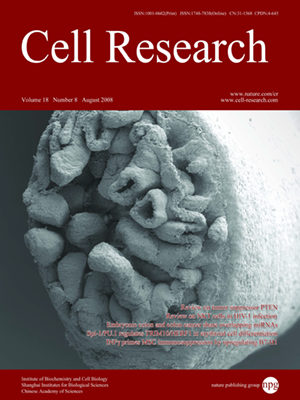
Volume 18, No 8, Aug 2008
ISSN: 1001-0602
EISSN: 1748-7838 2018
impact factor 17.848*
(Clarivate Analytics, 2019)
Volume 18 Issue 8, August 2008: 846-857
ORIGINAL ARTICLES
A critical role of IFNγ in priming MSC-mediated suppression of T cell proliferation through up-regulation of B7-H1
Huiming Sheng1,2,*, Ying Wang1,2,*, Yuqing Jin3,4, Qiuyu Zhang1,2, Yan Zhang1,2, Li Wang1,2, Baihua Shen1,2, Shuo Yin3,4, Wei Liu3,4, Lei Cui3,4 and Ningli Li1,2
1Shanghai Institute of Immunology, Shanghai 200025, China
2Institute of Medical Sciences, Shanghai Jiao Tong University School of Medicine, Shanghai 200025, China
3Department of Plastic and Reconstructive Surgery, 9th People's Hospital, Shanghai Jiao Tong University School of Medicine, Shanghai 200011, China
4National Tissue Engineering Center of China, Shanghai 200011, China
Correspondence: Ningli Li(ninglixiaoxue57@yahoo.com.cn )
Bone-marrow-derived mesenchymal stem cells (MSCs) have been shown to possess immunosuppressive properties, e.g., by inhibiting T cell proliferation. Activated T cells can also enhance the immunosuppression ability of MSCs. The precise mechanisms underlying MSC-mediated immunosuppression remain largely undefined, although both cell-cell contact and soluble factors have been implicated; nor is it clear how the immunosuppressive property of MSCs is modulated by T cells. Using MSCs isolated from mouse bone marrow, we show here that interferon gamma (IFNγ), a well-known proinflammatory cytokine produced by activated T cells, plays an important role in priming the immunosuppressive property of MSCs. Mechanistically, IFNγ acts directly on MSCs and leads to up-regulation of B7-H1, an inhibitory surface molecule in these stem cells. MSCs primed by activated T cells derived from IFNγ-/- mouse exhibited dramatically reduced ability to suppress T cell proliferation, a defect that can be rescued by supplying exogenous IFNγ. Moreover, siRNA-mediated knockdown of B7-H1 in MSCs abolished immunosuppression by these cells. Taken together, our results suggest that IFNγ plays a critical role in triggering the immunosuppresion by MSCs through up-regulating B7-H1 in these cells, and provide evidence supporting the cell-cell contact mechanism in MSC-mediated immunosuppression.
Cell Research (2008) 18:846-857. doi: 10.1038/cr.2008.80; published online 8 July 2008
FULL TEXT | PDF
Browse 1975


